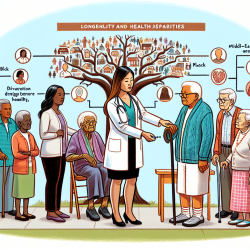Introduction
The recent study titled Consumption responses to an unconditional child allowance in the United States provides valuable insights into how financial support can influence family spending, particularly in areas crucial to child development. As practitioners in the field of speech-language pathology, understanding these consumption patterns can help us tailor our approaches to maximize therapeutic outcomes for children.
Understanding the Study
The study analyzed the effects of the expanded Child Tax Credit (CTC) under the American Rescue Plan Act, which provided monthly payments to families with children. Using anonymized mobile-location data and debit/credit card data, the study observed increased spending in childcare centers, health and personal care establishments, and grocery stores. These findings suggest that financial support can lead to increased access to essential services that support child development.
Implications for Speech-Language Pathologists
As speech-language pathologists, we can draw several implications from these findings:
- Enhanced Access to Services: The increased visits to childcare and health establishments indicate that families are more likely to seek services that support their children's development when financial barriers are reduced. This suggests that advocating for financial support policies could enhance access to speech-language therapy.
- Holistic Approach: Understanding that financial stability can lead to better access to health and educational resources, we should consider a holistic approach in our practice. Collaborating with other professionals in health and education can provide comprehensive support to children.
- Data-Driven Decisions: The use of data in this study highlights the importance of data-driven decisions in our field. By collecting and analyzing data on therapy outcomes, we can better understand the needs of our clients and adjust our methods accordingly.
Encouraging Further Research
The study opens avenues for further research in speech-language pathology. Practitioners are encouraged to explore how financial support impacts therapy outcomes and to consider integrating financial counseling as part of family support services. Additionally, research could focus on the long-term effects of increased access to resources on children's communication skills and overall development.
Conclusion
Incorporating insights from economic studies into speech-language pathology can enhance our understanding of the factors that influence therapy outcomes. By advocating for policies that support families financially and collaborating with other sectors, we can create an environment that fosters optimal development for children.
To read the original research paper, please follow this link: Consumption responses to an unconditional child allowance in the United States.










